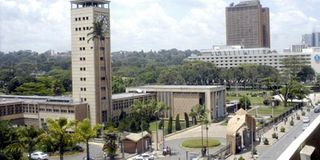Supreme Court’s plate already full

Photo/FILE
Kenya's Parliament buildings. Top on the list of the Supreme Court judges is expected to be the raging debate on taxation of MPs.
The Supreme Court will be confronted with a plateful of unresolved matters once the judges are sworn in.
Major controversies over different interpretations of the Constitution are headed to the court which is chaired by the Chief Justice.
Top on the list is expected to be the raging debate on taxation of MPs.
Some MPs who are opposed to being taxed have indicated that they will present their arguments before the court for interpretation.
They argue that payment of taxes on their allowances is unconstitutional, saying it amounts to review of employment contract midstream.
The MPs earn Sh851,000 but pay tax of Sh51,000 from Sh200,000 which is the salary while the rest are allowances.
The MPs say that the taxman had in the run up to the vote of the new constitution given a commitment in a letter to Parliament that they will not pay taxes.
The letter was read at a kamukunji (meeting) on June 30, 2010, attended by President Kibaki, Prime Minister Raila Odinga, Cabinet ministers Uhuru Kenyatta (Finance) and Mutula Kilonzo (Justice) and Attorney-General Amos Wako.
Mr Wako took the meeting through the provisions of the law including the National Assembly and Privileges Act to support the position that allowances of current MPs will not be taxed.
He said the requirements for taxation of all state officers would apply in the next Parliament. Mr Kilonzo, a senior counsel, and his Lands counterpart James Orengo, also a lawyer, agreed with Mr Wako’s opinion.
President Kibaki also gave an assurance that the MPs would not be taxed.
House Speaker Kenneth Marende has expressed surprise at the turn of events and confirmed that he was in possession of the commitment letters from the tax collector and Treasury, and Mr Wako’s opinion.
“We will go to the Supreme Court not to seek interpretation, but to present our case for violation of human rights by those who seek to illegally vary our contracts midstream,” said Kinangop MP, Ngugi.
Internal Security assistant minister Orwa Ojodeh said on Monday the MPs were “duped”.
“We have no option but to pay the taxes. I told them that a letter from KRA cannot supersede the Constitution,” he said.
Mr Kilonzo argues that the law is unclear on taxation of MPs and has asked dissatisfied Kenyans to go to court for interpretation.
“I want to entertain a sober interpretation of these provisions and also invite Kenyans who are aggrieved to go to the this wonderful court once the judges are sworn in, for interpretation.”
But Mr Charles Nyachae, chairman of the Constitution Implementation Commission is categorical that the law requires all Kenyans to pay taxes. (READ: Nyachae backs MPs tax move)
The Nyachae team has also sought a number of interpretations on controversial constitutional matters.
The commission wants a clear definition of “consultation” between President Kibaki and Mr Odinga whenever required to make critical decisions.
The CIC move was triggered by the aftermath of the President’s unilateral decision in February to appoint key judicial officers even as Mr Odinga declared he had not been consulted.
“The word ‘consultation’ drew a lot of heat and the right place to define the word is the court. We are not going to define the word at press conferences or public rallies,” said Mr Nyachae.
In addition, the CIC is seeking guidance on the basic requirements in the appointment of the constitutional office holders such as attorney-general and director of budget, especially the public participation, integrity and national values.
“Accountability, transparency, inclusiveness are important in appointment of public constitutional offices and we need to be told in practical terms what this means and where they apply,” said Mr Nyachae.
The court is also expected to handle the dispute over whether Cabinet ministers should hold party positions.
Mr Odinga has suggested that the court should be called upon to resolve the dispute on whether government ministers should head political parties.
Mr Nyachae argues that MPs are state officers and are barred by law from holding positions in political parties, but Mr Odinga disagrees.




